Namibia’s ruling South West Africa People’s Organization (SWAPO) faces a critical electoral challenge as the nation votes in one of its most competitive elections since gaining independence in 1990. For over three decades, SWAPO has held a firm grip on Namibian politics, but allegations of corruption and poor economic management have eroded public trust, placing its dominance at risk.
Vice President Netumbo Nandi-Ndaitwah, SWAPO’s presidential candidate, could make history as Namibia’s first female president. She has centered her campaign on promises of economic reform, job creation, and women’s rights, pledging to invest 85 billion Namibian dollars over five years to create over 500,000 jobs. Critics, however, question the viability of these ambitious goals, especially amid rising youth unemployment and disillusionment with SWAPO’s governance.
The opposition is more diverse and determined than ever. Panduleni Itula’s Independent Patriots for Change (IPC), formed after his departure from SWAPO, has emerged as a strong contender, challenging the ruling party’s record. In the 2019 elections, Itula garnered 30% of the vote as an independent candidate, signaling significant public dissatisfaction. Other opposition parties, such as the Popular Democratic Movement (PDM), have also sought to capitalize on SWAPO’s declining popularity.
However, opposition fragmentation remains a significant challenge. Namibia’s proportional electoral system allows even minor parties to gain parliamentary seats, often leading to a crowded political space without a unified opposition coalition. Analysts argue that this division could work to SWAPO’s advantage, enabling it to retain power despite a reduced majority.
SWAPO’s decline is part of a broader regional trend, with liberation movements across southern Africa losing electoral ground. The party lost its two-thirds parliamentary majority in 2019 and control of urban centers like Windhoek in subsequent local elections. Allegations of corruption, particularly a fishing industry scandal involving top officials, have further tarnished its reputation.
The stakes in this election are high, with over 1.4 million registered voters deciding not only the presidency but also the composition of the National Assembly. The outcome will reveal whether SWAPO can maintain its political dominance or if Namibia is on the cusp of significant political transformation, following the regional wave of changing leadership.
